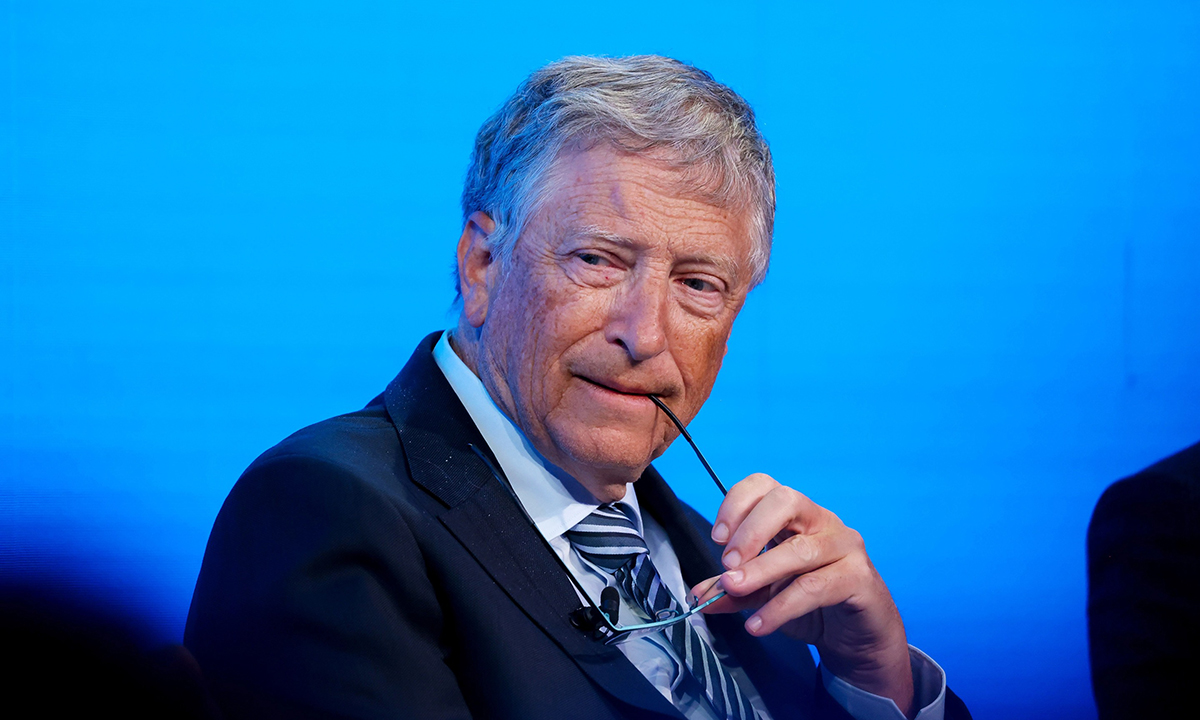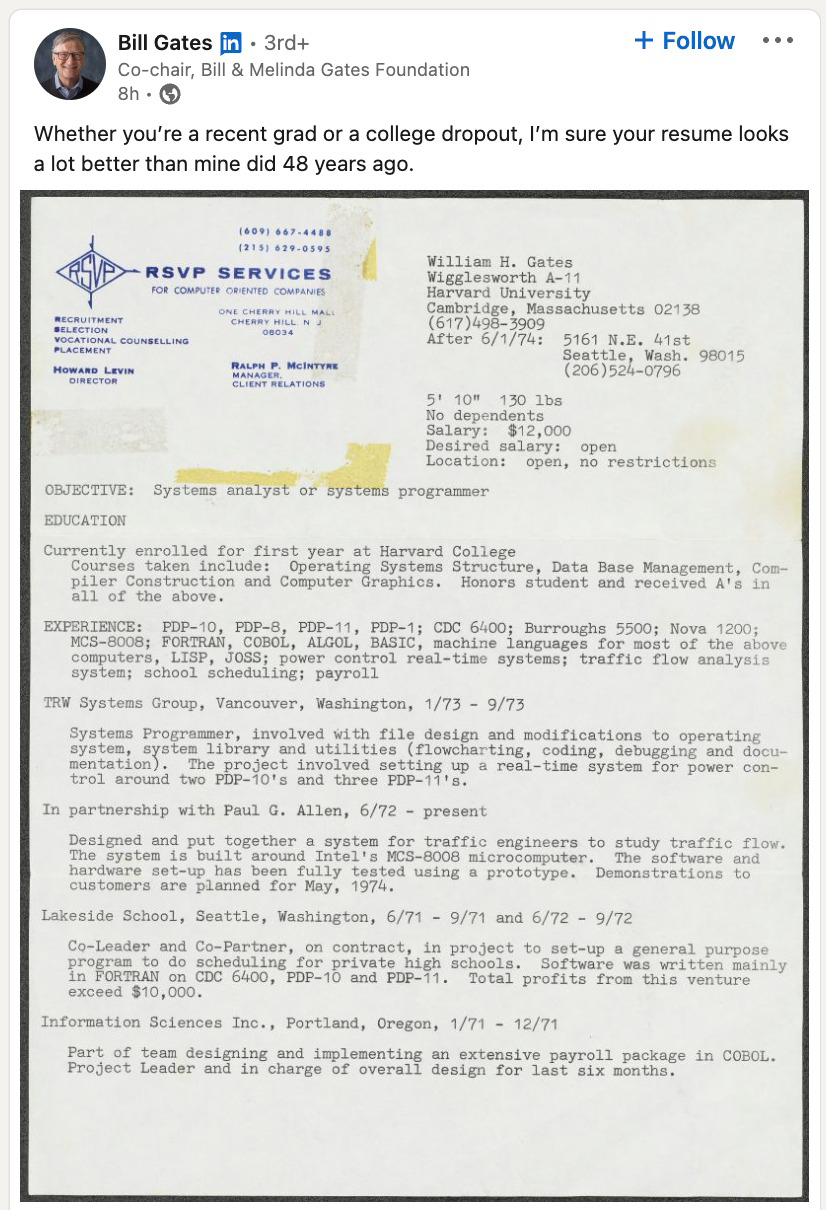
微軟公司(Microsoft)的聯(lián)合創(chuàng)始人、全球第四大富豪比爾·蓋茨在今年6月30日回溯了他卑微的出身:他分享了近50年前的簡歷。
“無論你是應(yīng)屆畢業(yè)生還是大學(xué)輟學(xué)生,我敢肯定你的簡歷看起來比我48年前的簡歷要好得多。”蓋茨在LinkedIn的帖子中打趣道。

在詳細(xì)描述他的教育和工作經(jīng)歷之前,蓋茨列出了他的“求職目標(biāo)”:系統(tǒng)分析師或系統(tǒng)程序員。為了支撐這一點,他表明自己在哈佛大學(xué)(Harvard University)上過相關(guān)課程,在家鄉(xiāng)西雅圖地區(qū)做過兩份不同的工作,掌握了編程技能,還與保羅·艾倫有過合作——第二年,他和艾倫正式成立了微軟公司。
蓋茨的簡歷在1974年也許很平常,但其中的一些細(xì)節(jié),專家建議不要寫進(jìn)去。
錯誤一:太深入
蓋茨18歲時在打字機(jī)上寫下的簡歷,其中包括他當(dāng)時的地址(他的大學(xué)一年級宿舍)以及一些個人細(xì)節(jié),這些在今天看來是很不合適的。他說明了他的身高(5英尺10英寸,即1.778米)、他的體重(130磅,即58.967公斤),以及他沒有家屬的事實。
蓋茨應(yīng)該避免這些不相關(guān)的信息。簡歷寫作服務(wù)公司Leet Résumés的創(chuàng)始人馬克·塞內(nèi)德拉告訴《財富》雜志:“當(dāng)然,你可以寫愛好、興趣、語言技能、最喜歡的樂隊和抱負(fù)。但是,將那些不能說明你負(fù)責(zé)任和努力工作的能力信息保持在一個合理的范圍內(nèi)。”
錯誤二:動詞使用單一
雖然簡歷的具體格式各不相同,但職業(yè)指導(dǎo)服務(wù)公司Next Great Step的創(chuàng)始人貝絲·亨德勒-格倫特強(qiáng)調(diào)要使用行為動詞來展示你在每個職位取得的成就。她建議不要在每句話的開頭都寫“負(fù)責(zé)”(responsible for),例如:“我負(fù)責(zé)辦公室的文件歸檔系統(tǒng)。”
相反,使用行為動詞的過去式,比如“建立了”(built)、“創(chuàng)建了”(created)、“開發(fā)了”(developed);例如:“我開發(fā)了一個簡化辦公室組織流程的文件歸檔系統(tǒng)。”嘗試使用不同的動詞來描述每種經(jīng)歷。
當(dāng)蓋茨用“設(shè)計了”這個動詞(designed)來展示他創(chuàng)建的交通系統(tǒng)時,該行為動詞僅止于此。他大量使用“參與了”(involved with)這個詞,這個詞更被動,并且重復(fù)出現(xiàn)多次。
錯誤三:不必要的分心
我們將容許蓋茨做出一些在今天看來沒有意義的風(fēng)格選擇:比如,將看起來像職業(yè)服務(wù)公司的名片復(fù)制到左上角。這尤其糟糕,因為它位于黃金位置,這是簡歷讀者首先會被吸引的位置。在這個區(qū)域,你要填寫你的榮譽(yù)、教育和成就——而不是為某家公司提供免費(fèi)的廣告空間。
排版和顏色使簡歷看起來很繁雜,塞內(nèi)德拉強(qiáng)烈警告不要這樣做。
除此之外,蓋茨的簡歷風(fēng)格和形式與典型招聘人員的期望相符合。盡管存在缺陷,但可以肯定地說,蓋茨知道他在做什么。在他點擊“提交”簡歷十二年后,他成為了億萬富翁。六年后,他成為了世界首富。
也許成功的秘密真的是寫上你的身高信息——但我們不能指望它。(財富中文網(wǎng))
譯者:中慧言-王芳
微軟公司(Microsoft)的聯(lián)合創(chuàng)始人、全球第四大富豪比爾·蓋茨在今年6月30日回溯了他卑微的出身:他分享了近50年前的簡歷。
“無論你是應(yīng)屆畢業(yè)生還是大學(xué)輟學(xué)生,我敢肯定你的簡歷看起來比我48年前的簡歷要好得多。”蓋茨在LinkedIn的帖子中打趣道。
在詳細(xì)描述他的教育和工作經(jīng)歷之前,蓋茨列出了他的“求職目標(biāo)”:系統(tǒng)分析師或系統(tǒng)程序員。為了支撐這一點,他表明自己在哈佛大學(xué)(Harvard University)上過相關(guān)課程,在家鄉(xiāng)西雅圖地區(qū)做過兩份不同的工作,掌握了編程技能,還與保羅·艾倫有過合作——第二年,他和艾倫正式成立了微軟公司。
蓋茨的簡歷在1974年也許很平常,但其中的一些細(xì)節(jié),專家建議不要寫進(jìn)去。
錯誤一:太深入
蓋茨18歲時在打字機(jī)上寫下的簡歷,其中包括他當(dāng)時的地址(他的大學(xué)一年級宿舍)以及一些個人細(xì)節(jié),這些在今天看來是很不合適的。他說明了他的身高(5英尺10英寸,即1.778米)、他的體重(130磅,即58.967公斤),以及他沒有家屬的事實。
蓋茨應(yīng)該避免這些不相關(guān)的信息。簡歷寫作服務(wù)公司Leet Résumés的創(chuàng)始人馬克·塞內(nèi)德拉告訴《財富》雜志:“當(dāng)然,你可以寫愛好、興趣、語言技能、最喜歡的樂隊和抱負(fù)。但是,將那些不能說明你負(fù)責(zé)任和努力工作的能力信息保持在一個合理的范圍內(nèi)。”
錯誤二:動詞使用單一
雖然簡歷的具體格式各不相同,但職業(yè)指導(dǎo)服務(wù)公司Next Great Step的創(chuàng)始人貝絲·亨德勒-格倫特強(qiáng)調(diào)要使用行為動詞來展示你在每個職位取得的成就。她建議不要在每句話的開頭都寫“負(fù)責(zé)”(responsible for),例如:“我負(fù)責(zé)辦公室的文件歸檔系統(tǒng)。”
相反,使用行為動詞的過去式,比如“建立了”(built)、“創(chuàng)建了”(created)、“開發(fā)了”(developed);例如:“我開發(fā)了一個簡化辦公室組織流程的文件歸檔系統(tǒng)。”嘗試使用不同的動詞來描述每種經(jīng)歷。
當(dāng)蓋茨用“設(shè)計了”這個動詞(designed)來展示他創(chuàng)建的交通系統(tǒng)時,該行為動詞僅止于此。他大量使用“參與了”(involved with)這個詞,這個詞更被動,并且重復(fù)出現(xiàn)多次。
錯誤三:不必要的分心
我們將容許蓋茨做出一些在今天看來沒有意義的風(fēng)格選擇:比如,將看起來像職業(yè)服務(wù)公司的名片復(fù)制到左上角。這尤其糟糕,因為它位于黃金位置,這是簡歷讀者首先會被吸引的位置。在這個區(qū)域,你要填寫你的榮譽(yù)、教育和成就——而不是為某家公司提供免費(fèi)的廣告空間。
排版和顏色使簡歷看起來很繁雜,塞內(nèi)德拉強(qiáng)烈警告不要這樣做。
除此之外,蓋茨的簡歷風(fēng)格和形式與典型招聘人員的期望相符合。盡管存在缺陷,但可以肯定地說,蓋茨知道他在做什么。在他點擊“提交”簡歷十二年后,他成為了億萬富翁。六年后,他成為了世界首富。
也許成功的秘密真的是寫上你的身高信息——但我們不能指望它。(財富中文網(wǎng))
譯者:中慧言-王芳
Bill Gates, Microsoft cofounder and fourth-richest man in the world, returned to his humble roots on June 30: He shared his résumé from nearly 50 years ago.
“Whether you’re a recent grad or a college dropout, I’m sure your résumé looks a lot better than mine did 48 years ago,” Gates quipped in a LinkedIn post.
Before diving into his education and work experience, Gates included his “objective”: systems analyst or system programmer. He backed it up with his relevant Harvard coursework, his coding skills from two different jobs in his native Seattle area, and the small fact that he’d worked in partnership with Paul Allen—with whom he would officially found Microsoft the following year.
Gates’ résumé may have been par for the course in 1974, but it includes a few details that today’s experts advise against.
Mistake No. 1: Going too deep
The résumé, which Gates wrote on a typewriter at age 18, includes his then-address (his freshman dorm) as well as some personal details that would be way out of place today. He notes his height (5'10"), his weight (130 pounds), and the fact that he has no dependents.
Gates should have avoided including such irrelevant information. “Sure, you’ve got hobbies, interests, languages, favorite bands, and ambitions,” Marc Cenedella, founder of Leet Résumés, a résumé writing service, told?Fortune. “But keep the information that doesn’t address your ability to be responsible, accountable, and a hard worker to a reasonable level.”
Mistake No. 2: Lack of verb variety
While the exact line-by-line format of a résumé can vary, Beth Hendler-Grunt, founder of career coaching service Next Great Step, emphasizes using action verbs to show what you accomplished in each role. She advises against saying “responsible for” at the beginning of each sentence—as in, “I’m responsible for the office filing system.”
Instead, use past-tense action verbs, like “built,” “created,” or “developed”; consider, “I developed a filing system that streamlined the office organizational flow.” And try to use different verbs for each experience.
While Gates used “designed” to demonstrate a traffic system he created, his action verbs stopped there. He leaned heavily on “involved with,” which is more passive and repetitive.
Mistake No. 3: Needless distraction
We’ll allow Gates some stylistic choices that don’t make sense today: namely, the business card for what looks like a career services company copied onto the top-left corner. This is especially bad, because it’s in prime real estate where the résumé reader’s eye is going to be drawn first. In that area, you want to stack your accolades, education, and achievements right away—not provide free ad space for a company.
The placement and color makes the résumé appear busy, which Cenedella highly warns against.
Other than that, Gates’ style and format are fairly consistent with a typical recruiter’s expectations. Despite the flaws, it’s safe to say Gates knew what he was doing. Twelve years after he hit “submit” on that résumé, he became a billionaire. Six years after that, he became the world’s richest man.
Maybe the secret to success really is including your height—but we wouldn’t count on it.






